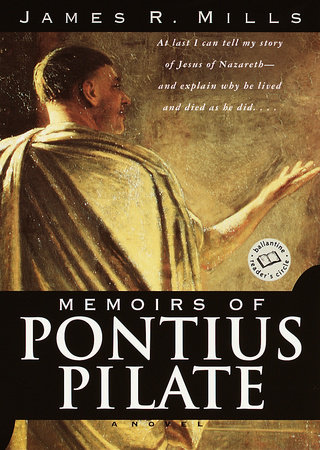Memoirs of Pontius Pilate Reader’s Guide
By James R. Mills


1. Reading Group Questions and Topics for Discussion
With what impression of Pontius Pilate did you pick up James Mills’s book? What shaped that impression? How did Memoirs of Pontius Pilate challenge if not redefine your understanding of Pilate?
2. Mills has stated his ambition to write a fifth Gospel, one from the perspective of an enemy rather than a follower of Christ. To what extent does Mills succeed? What does his work have in common with the four Gospels? How does it differ?
3. Characterize the tone in which Mills’s Pilate recounts the time in which his life intersected with that of Christ’s. Given the retrospective gaze of the writing, do we discover in it considerable reflection or regret? What explains the evenness with which Pilate chronicles his tumultuous past?
4. A number of timely and timeless clashes and contradictions appear in Pilate’s memoir: politics and religion, private ambition and public expectation, the secular and the sacred, landed and nomadic cultures, competing truths, faith and reason, literal and liberal interpretations of Scripture, prophecy and paranoia, vilifying and sanctifying, etcetera. Discuss them. What conflicts would you add to the list? What do we learn about these matters in weighing the reasons for Pilate’s decisions? Are such issues fated to persist? Why?
5. What do we learn about crime and punishment in Christ’s time? What has and hasn’t changed today? What connections can we draw between crucifixion and the death penalties of today?
6. Mills calls his book a novel, while making clear a fidelity to the depictions of Pilate presented in the four Gospels. Attempt definitions of fiction, mythology, and history vis-a-vis the Bible and Memoirs of Pontius Pilate. Where do the genres overlap? How is each distinct? How does an oral tradition compare to a written one?
7. Provide examples of Pilate’s qualities and shortcomings. What has the upperhand? Why? Do his weaknesses deepen or compromise his humanity? Why?
8. How does Pilate’s regard for the God-worshipping Jews differ from his perspective on Roman pagans? Where does Pilate stand on the God/gods question?
9. Compare Mills’s Pilate to the man depicted in the four Gospels. To which Gospel is Mills most indebted? With which aspects of Pilate’s character does he take the most liberty? The least?
10. How is Christ depicted throughout Pilate’s memoir? What contributes most to Pilate’s understanding of the man’s past and present? What weight do you assign to the letters of Joseph ben Caiaphas in coloring Pilate’s perception of Christ?
11. What import do prophecy, superstition, dreams, and visions hold in Christ’s time? What explains a group or individual’s willingness to invest much in them? How does the otherworldly shape the worlds of politics and religion?
12. To what extent is Pilate a reliable narrator? What leads you to question or accept the veracity of his telling? Does his memoir attempt some sort of objectivity or play loose with events in the name of self-justification?
13. Discuss the scene in which Pilate asks Christ to define truth. What compels such a question, and in what tone is it asked–sardonic, earnest, reflective, etcetera? How does the elusiveness of an answer affect our reading of Pilate’s memoirs?
14. In his waning years, Pilate notes that "political and religious leaders are willing to tolerate a man of principle only as long as he does not become a nuisance to them." How does his statement resonate in light of the stories he tells? What twentieth-century examples illustrate Pilate’s point?
15. Seek out non-Christian and non-Western chronicles of Pilate’s life, e.g., those collected in Ann Wroe’s scholarly biography, Pontius Pilate. How does the depiction of Pilate’s character differ from culture to culture, religion to religion? What do the myriad presentations tell about narrators and their subjects?
16. How many are responsible for the death of Christ? Who deserves the most blame?
17. What would you have done in Pilate’s dilemma?
Just for joining you’ll get personalized recommendations on your dashboard daily and features only for members.
Find Out More Join Now Sign In